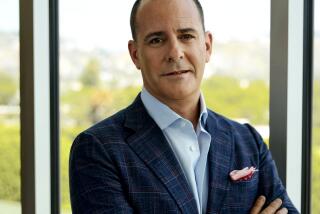News Corp. Exec Set Up Easy Exit
News Corp. President Peter Chernin, expected to be among the top candidates to replace Michael Eisner as Walt Disney Co. chief executive, negotiated a finely worded employment agreement last summer that would allow him to take the job without giving lengthy notice to his current boss.
The employment agreement, disclosed in an annual filing with the Securities and Exchange Commission late Wednesday, took months to complete, mainly because of dickering over a clause dealing with terms of departure, according to sources close to the negotiation.
Chernin wanted the agreement to allow enough flexibility for him to take Disney’s top job or the top position at any one of several other media conglomerates, sources told The Times. And he wanted the ability to leave “with cause” if his boss, Rupert Murdoch, left the chief executive suite without naming Chernin to succeed him.
The agreement says that if anyone other than Murdoch is chairman and CEO of News Corp., Chernin could resign “for good reason.” That would entitle him to a payment of at least $40 million in cash, plus a truckload of other benefits.
Specifically, Chernin would get full vesting of his stock options and stock appreciation rights, currently worth more than $18 million. News Corp. would also pay for his medical, dental, disability and life insurance coverage, plus any “golden parachute” excise taxes levied on the deal.
Chernin would also have the right to a six-year film and TV production agreement that would provide terms at least as favorable as the most favorable agreement provided to anyone else, according to the SEC filing.
Sources said the stickiest provision in the contract was a clause that stipulated what would happen if Chernin “terminates his employment without good reason to become the chief executive officer of another company engaged in material business that is competitive” with News Corp.
The final agreement said Chernin would have to provide six months’ notice and obtain Murdoch’s permission if the company he left News Corp. to run “is not a listed company and its direct or indirect parent is a listed company.”
Translation: Chernin can leave in a snap to run Disney or another media company such as Time Warner Inc. that is listed on the New York Stock Exchange or another major exchange. But he’d have to get permission to leave to run a subsidiary of a public company, sources said.
At the same time, Chernin’s compensation agreement also provides plenty of incentive for him to stay. Chernin, who earned $16.3 million in salary and bonuses during the company’s 2004 fiscal year ended June 30, is guaranteed base pay of at least $3.8 million through June 2009. If the company meets certain performance standards, he could earn a bonus of up to $25 million paid in both cash and stock, according to the agreement.
The Disney board is expected to name a successor to Eisner by June.
More to Read
The biggest entertainment stories
Get our big stories about Hollywood, film, television, music, arts, culture and more right in your inbox as soon as they publish.
You may occasionally receive promotional content from the Los Angeles Times.










